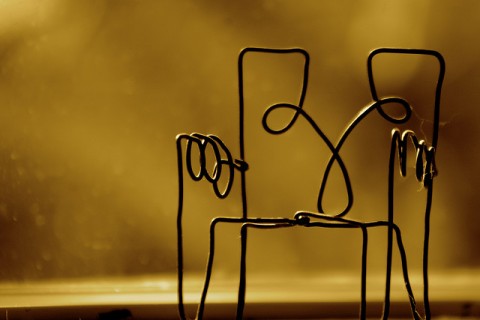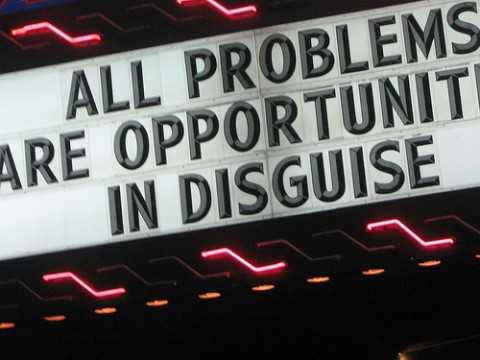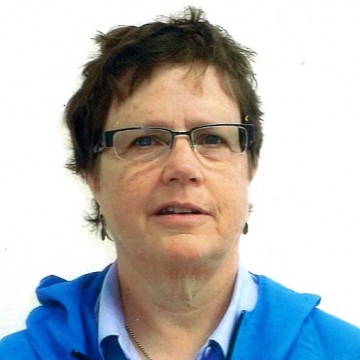Tag Archive: facilitation
December 8, 2010
Last month we were graced by the presence of Kathy Sferra, who was on loan from Mass Audubon. Kathy took the initiative to approach us about spending one month of her six week sabbatical apprenticing herself to IISC, observing and contributing to our work and taking the lessons back to her home organization. She began contributing instantly as a thought partner, often making keen observations and asking good questions that her relative outsider perspective afforded. As her parting gift to us, Kathy offered up the following reflections and take-aways, specifically with respect to designing and facilitating meetings and other convenings, that I wanted, in the spirit of the season, to re-gift and pass along: Read More
October 21, 2010

|Photo by|www.flickr.com/photos/nikonvscanon/1302296182|
This post first appeared back in March of this year, and I am re-posting as I prepare to co-present a session tomorrow at the Bioneers by the Bay gathering in New Bedford, MA. In our session, “Transformative Leadership for Sustainability” we will experience each of the dimensions below . .
As process designers, facilitators, and change agents, we are called upon to help create conditions in which amazing things can happen between people, whether alignment, agreement building, innovation, etc. At times this can be a tall order. Thankfully we are supported by an array of tools and techniques at our disposal. Knowing which of the social architect’s tools to turn to in any given situation is a core challenge. Something I’ve recently found useful as a guide is consideration of the different dimensions of social space and how these can be leveraged so that collective work can bring about the very best.
Read More
August 26, 2010

|Photo by brew ha ha|http://www.flickr.com/photos/redfishid/3164273464|
“The Uses of Not”
Thirty spokes
meet in the hub.
Where the wheel isn’t
is where it’s useful.
Hollowed out,
clay makes a pot.
Where the pot’s not
is where it’s useful.
Cut doors and windows
to make a room.
Where the room isn’t,
there’s room for you.
So the profit in what is
is in the use of what isn’t.
-Lao Tzu, Tao Te Ching
It was the afternoon of the second day of the three day training and I noticed that the coffee cake still looked pretty much as it had on the morning of day one.
“Sure does look good,” said one of the participants, now standing beside me.
“Not good enough to eat, apparently. ” I responded.
“Oh, I think everyone likes having it here,” she said with a grin.
“To look at?” I asked.
“To resist!” she replied, with a distinct tone of satisfaction. Read More
August 26, 2010

|Photo by brew ha ha|http://www.flickr.com/photos/redfishid/3164273464|
“The Uses of Not”
Thirty spokes
meet in the hub.
Where the wheel isn’t
is where it’s useful.
Hollowed out,
clay makes a pot.
Where the pot’s not
is where it’s useful.
Cut doors and windows
to make a room.
Where the room isn’t,
there’s room for you.
So the profit in what is
is in the use of what isn’t.
-Lao Tzu, Tao Te Ching
It was the afternoon of the second day of the three day training and I noticed that the coffee cake still looked pretty much as it had on the morning of day one.
“Sure does look good,” said one of the participants, now standing beside me.
“Not good enough to eat, apparently. ” I responded.
“Oh, I think everyone likes having it here,” she said with a grin.
“To look at?” I asked.
“To resist!” she replied, with a distinct tone of satisfaction. Read More
June 17, 2010
“When you improve a little each day,
eventually big things happen.”
-The late John Wooden

|Photo by aldoaldoz|http://www.flickr.com/photos/aldoaldoz/2340226779|
Since February I’ve been experiencing back pain in a constant and distracting (though not quite incapacitating) way, a result of having poor posture at the computer, not taking enough breaks while sitting, lifting too many small children, and being another year older. A couple of months ago I went to a chiropractor and he did his best to wrench me back into alignment. This worked for a few days, and then things were back as they were. I enlisted the help of a “deep tissue” masseuse who went after my back muscles with steady steam rolling force. Again, for a few days I was on top of the world, and then it was back to square one. Then, about two weeks ago, I started seeing a physical therapist, who has given me some gentle stretches and postural shifts and done light massage on my left shoulder. Et voila, real progress! Small and subtle shifts have yielded major and lasting results.
Read More
June 9, 2010

|Photo by Scarleth White|http://www.flickr.com/photos/iloveblue/3302032125|
Thanks to Ginny McGinn of the Center for Whole Communities for introducing me to this poem by the Chilean biologist/philosopher Humberto Maturana. We used it to launch this week’s The Masterful Trainer workshop, and it generated some wonderful reflections on the role of teaching, training, facilitation, and leadership in this day and age. Enjoy . . .
The Student’s Prayer
Don’t impose on me what you know,
I want to explore the unknown
and be the source of my own discoveries.
Let the known be my liberation, not my slavery.
The world of your truth can be my limitation;
your wisdom my negation.
Don’t instruct me; let’s walk together.
Let my riches begin where yours end.
Show me so that I can stand
on your shoulders.
Reveal yourself so that I can be
something different.
You believe that every human being
can love and create.
I understand, then, your fear
when I ask you to live according to your wisdom.
You will not know who I am
by listening to yourself.
Don’t instruct me; let me be.
June 9, 2010

|Photo by Scarleth White|http://www.flickr.com/photos/iloveblue/3302032125|
Thanks to Ginny McGinn of the Center for Whole Communities for introducing me to this poem by the Chilean biologist/philosopher Humberto Maturana. We used it to launch this week’s The Masterful Trainer workshop, and it generated some wonderful reflections on the role of teaching, training, facilitation, and leadership in this day and age. Enjoy . . .
The Student’s Prayer
Don’t impose on me what you know,
I want to explore the unknown
and be the source of my own discoveries.
Let the known be my liberation, not my slavery.
The world of your truth can be my limitation;
your wisdom my negation.
Don’t instruct me; let’s walk together.
Let my riches begin where yours end.
Show me so that I can stand
on your shoulders.
Reveal yourself so that I can be
something different.
You believe that every human being
can love and create.
I understand, then, your fear
when I ask you to live according to your wisdom.
You will not know who I am
by listening to yourself.
Don’t instruct me; let me be.
June 3, 2010

|Photo by DonnaGrayson|http://www.flickr.com/photos/donnagrayson/195244498|
I have been struck by how much guidance an enlightened parenting concept I recently learned offers to the work of leadership and facilitation. The concept comes from a book that a neighbor lent to my wife and me as we were beginning to think more about how best to address some our 4 year old daughter’s testing of limits.
Read More
May 13, 2010

|Photo by Flowery *L*u*z*a*|http://www.flickr.com/photos/luchilu/747345256|
For the past few weeks, in a series of Thursday posts, we’ve addressed what it takes to tap the full potential of collaboration to shift to more environmentally sustainable ways of living and working. We’ve explored the importance of bringing diverse systemic perspectives together and developing shared identities and values as a way of achieving greater ecological intelligence and commitment. And as a friend of mine says, you can bring great groups together with the best of intentions and still end up with nothing or a mess. So what else can we put into place to help ensure we reach the sustainable ends we seek?
Read More
May 12, 2010

|Photo by A Perfect Vacuum|http://www.flickr.com/photos/jamesmuckian/515141082/sizes/m/|
This is the fourth in a series of postings about power and group facilitation processes, based on research from a few years ago. Today’s post is about how power is built into group narrative.
As I was doing research, I came across a batch of work about narrative theory by Sara Cobb and Janet Rifkin (cited below). Cobb and Rifkin researched how a narrative is constructed and what impact it has on the ultimate outcome of mediation sessions. They found that the first story told tends to be privileged and “colonize” later stories told.? By framing the discussion to come, this initial story tends to narrow and define the direction of the ensuing conversation. Later versions are generally tied to the initial story and thus are unable to be fully developed. And the outcome of mediation is generally tied to the initial story. Read More
April 27, 2010

IAF Workshop
I’m just getting back from the International Association of Facilitator’s North America Conference and co-leading a workshop focused on the facilitator’s inner journey. It was a cool set up. The presenters included our convener, Larry Dressler as well as experienced facilitators, Erica Peng, Roger Schwarz and Beatrice Briggs. Read More
April 26, 2010

|Photo by Qoncept|http://www.flickr.com/photos/37418570@N03/4488784822|
With another public offering of Pathway to Change on the horizon (May 4-6), I’ve been putting my thinking towards how best to encapsulate this robust course, which focuses on skills and frameworks for designing and facilitating collaborative change efforts. The genius behind IISC’s courses in general (for which I can take absolutely no credit) is the simple elegance of the visuals that capture many of the essential ideas and steps. That said, we can sometimes find ourselves awash in images and wanting something a little more to the point to guide us. For these purposes, I’ve boiled the course down to a series of key questions that stand behind the various models. So here is the Curtis’ Notes version (which also applies to a related course, Engage for Results, that we offer to foundations in partnership with GEO):
Read More











